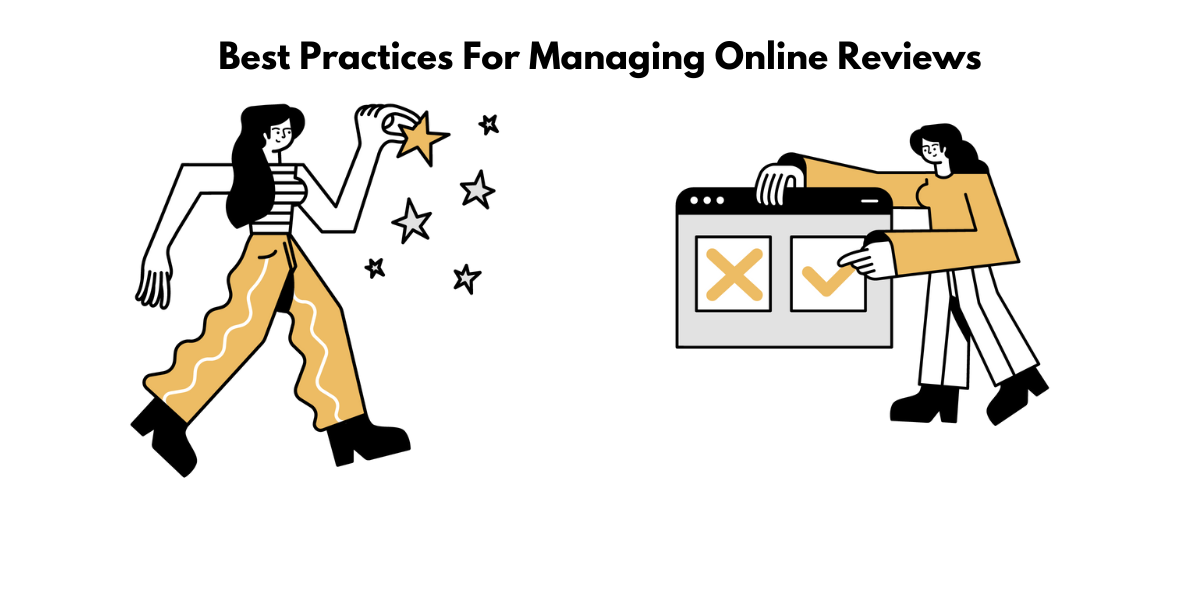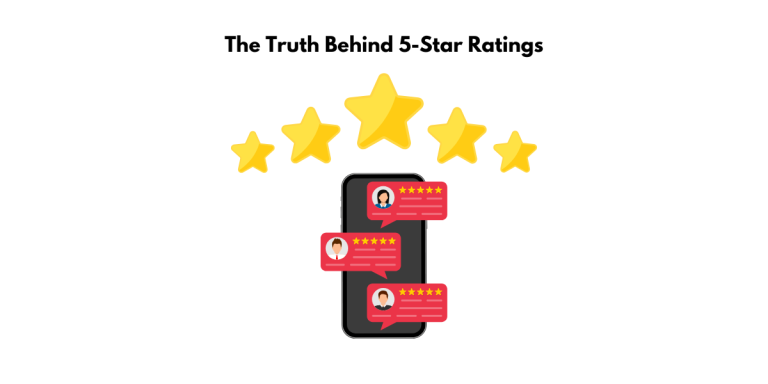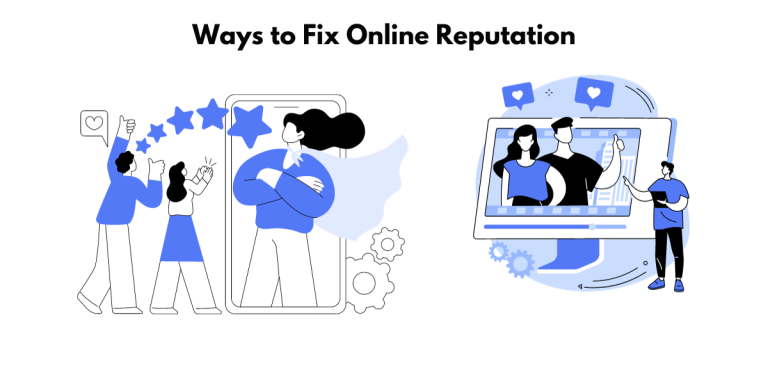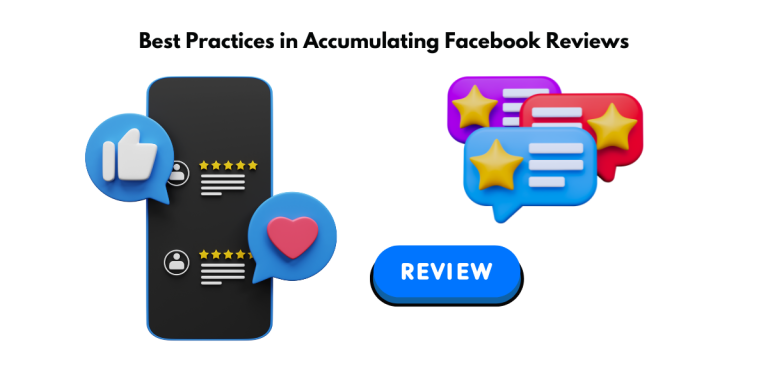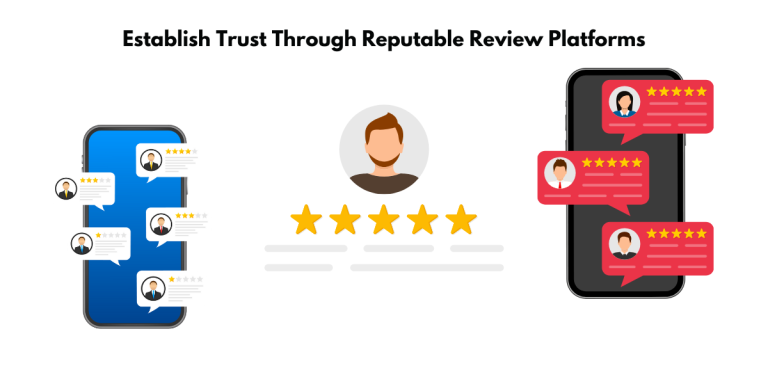Managing Online Reviews
Online review management is the process of review monitoring, collecting, and analyzing online reviews. It’s a way for businesses to improve their content marketing strategy by understanding what customers say about them online. Additionally, it encourages potential customers to take action before they read a negative review to help businesses improve business performance overall.
A study found that 94% of people will avoid a company after reading an online review. Online reviews have contributed to an increased sensitivity to customer opinions. Businesses must now be more aware of their positive reputation online and the power that consumers hold over it. As a result, many companies turn to review management to protect their image and build trust with potential and current customers.
What is online review management?
Online review management is a process that helps companies improve their marketing strategy by monitoring and analyzing reviews. Additionally, online review management encourages potential customers to take action before they read a negative review to help businesses improve business performance overall.
A study found that 94% of people will avoid a company after reading a review online. This demonstrates the importance of online reviews and how they can significantly impact businesses. Because of this sensitivity to customer opinions, you must know that it is important to maintain your reputation online and the power that consumers hold over it.
You should have an online review management strategy in 2019 because, as we’ve seen, online reviews are becoming increasingly important for businesses. It’s essential to have a system in place so you can identify and address any negative comments before they cause too much damage. Online reputation management helps businesses collect and manage customer reviews to improve their business, build trust, and get more positive reviews from satisfied customers.
Why online reviews are important
Businesses know that potential customers often consult online reviews before making a purchase. And in the era of social media, employees and business partners are also influenced by online reviews. That’s why businesses need to have a plan for managing their reputation online.
People often rely on positive reviews to make purchasing decisions. A study by BrightLocal found that 84% of consumers trust online reviews as much as a personal recommendations. Additionally, most people (57%) will only consider businesses with 4 or 5 stars. If your business has negative comments, you are in a disadvantageous position.
How important are online reviews for businesses?
The internet has become so intertwined with our society that what happens online can greatly affect your offline life. Your online reputation is your reputation, period. The internet is a platform for word-of-mouth information. Celebrities, social media personalities, or bloggers have the power to create trends and influence purchasing decisions. Online reviews are an important part of digital marketing services because they can create a conversation around your small business that no other type of advertising could do. Potential customer reviews are extremely important and can make or break your business. 94% of people avoid local businesses with negative reviews. New customer reviews can tell you how to improve and show that you care. Negative reviews need to be managed, not ignored.
How to track online reviews?
There are various ways to track online reviews, depending on the size of your business and how often you check them. Larger businesses might want to consider using customer review software that consolidates all reviews into one dashboard to get an overview of what customers are saying about them online.
If you only review reviews once a week (or less), then tracking them manually is probably the way. You’ll need to set aside time each week to read through positive and negative customer feedback. It’s important to stay on top of what people are saying about your company, as bad or fake reviews can hurt your business’ reputation.
Smaller businesses might be better off using alerts or notifications to let them know when a new review has been posted. This way, they don’t have to check for updates every day – which can be especially helpful if they’re busy running their business!
Why do customers leave online reviews?
Reviews are important for businesses because they can persuade potential customers to buy a product. Additionally, reviews are a quick way for consumers to make purchase decisions, especially when trying to find the best option. Furthermore, reviews are more valuable when given soon after an experience. Finally, businesses should ask for reviews at the beginning of a transaction, not months later.
Undoubtedly, reviews are important for businesses as they help people decide on their future purchases. Additionally, positive reviews can be a good way to encourage other customers to leave good reviews on your company’s behalf. This will show that other people have had a positive experience with your business and may persuade them to patronize you in the future.
How do you handle online customer reviews?
Customer reviews can make or break a business. When handled properly, unhappy customer reviews can be used to give feedback and build bonds with consumers. However, negative online reviews can have disastrous consequences for a company’s reputation when not managed well.
Fortunately, businesses can use some tools and services to help them manage their online reputation. For example, business reputation management software can automate managing reviews across different platforms such as Yelp, Google Alert, Facebook, Trip Advisor, and Amazon. This type of software is valuable for business owners who have no prior experience in customer relations, social network marketing, or digital marketing.
Online reviews management is helpful when they are positive; however, the internet is vicious, and it can be difficult to manage your reputation online if you don’t have the right tools. That’s where Reputation Management comes in – it helps people build and maintain a good reputation online by monitoring what people are saying about them on the web and taking corrective action where necessary. It’s important to note that Reputation Management is an ongoing process that requires time and effort if you want to see results – but once you have set up some guidelines, it will be easier in the long run.
How to get more online reviews?
Review sites like Yelp, Google, Facebook, and industry-specific websites. If you’re not signed up for them, you’re missing out on a great way to gain better control of your social network and online reviews.
The last sentence is a metaphor. If you’re only focusing on marketing and advertising, you’re neglecting the customer experience, which can lead to customers leaving reviews – either good or bad.
How can businesses get more online reviews?
Nowadays, online reviews are one of the most important aspects of a business. A good review can bring in more customers, while bad or fake reviews can drive them away. So, businesses need to know how to get more online reviews.
There are several ways to do this. Firstly, you can improve your service and ask your customers to leave reviews on platforms like Google Reputation Management, Yelp, and TripAdvisor. Secondly, you can ask for reviews from interested people on social networks. You can also get more online reviews by targeting your audience on general sites like Google My Business, Yelp, and Edmunds. To target your audience on a niche site, you need to make it easy for them to share their review with others – either through a pre-written review or by commenting directly from the website.
There are a few primary ways businesses can increase the number of online reviews. The first is to use a two-question popup survey. This will help you get more reviews while also gathering important customer data. Additionally, Review Management software can improve your online presence and reputation while making the review process easier for you and your customers. Finally, you can “shock” your ratings into an increase by actively soliciting reviews from happy customers. Overall, online reviews are important for businesses, so it’s important to make them more visible and easier to obtain.
How often should businesses check their online reviews?
Businesses need to be aware of the conversation happening around them online. This includes being cognizant of what people say about them on a review platform, social network, and blog posts. Regular checking in on your reputation online is one way to make sure you’re always putting your best foot forward.
Most experts recommend checking in at least once a week. However, if your business is facing a PR crisis, it’s important to check more frequently until the issue has been resolved. Additionally, if you’re running a marketing campaign that relies heavily on reviews (like scheduling demos), it’s important to monitor those reviews closely and respond promptly to any negative feedback.
What are some other tips for managing online reviews?
There are a few things to keep in mind when managing reviews:
- 33% of customers change their reviews when they receive a response. So, it’s important always to be responsive and courteous when addressing prospective customer feedback.
- Set aside the frustration that can come with reading negative reviews and try to open the door to connect with current and future potential customers.
- When responding to online reviews, personalize it by name and add remarks if steps will be taken internally. A response should include your position as well as your name.
- Responding to online reviews can positively impact your rating on sites like Yelp or Google+.
- Survey results from The Sprout Social Index, Edition XII: Call-Out Culture show that responding to reviews on social networks helps consumers form a more positive opinion of the business overall.
- Reviews can damage a company’s reputation if they’re not addressed constructively. However, if the brand gives a great response to a question, it could force reconsideration from some unhappy consumers.
Overall, taking care of both good and bad customer feedback is a key part of maintaining an effective social media strategy.
Best practices for managing online reviews of your business
Managing your online reviews is an important part of protecting your brand reputation. By responding to reviews, you can show that you care about your customers and their experience with your business. Additionally, it’s important to collect feedback from customers in various ways – not just through one platform. This will help you better understand how people perceive your business. Additionally, using review management software can automate the collecting and vetting of reviews for accuracy.
Managing reviews is an important part of any business’s marketing strategy. By increasing brand exposure, converting prospects into loyal customers, and garnering competitive insights, review management can help a business achieve its goals. There are different ways to manage online reviews, including using specialized bad review sites and verifying reviewers and reviews for authenticity. The best company puts its reputation on the line with every review, unlike other sites that don’t do this.
There are several online review sites that businesses can use to get feedback from their customers. However, not all of these sites are created equal. Some sites, like Trustpilot and Sitejabber, have a lot of unreliable reviews. It’s important to be aware of these sites and not rely too heavily on their feedback.
Proactively request feedback
The best way to get feedback is to request it from customers proactively. Many platforms allow a business to email or text customers asking if they would refer friends and family. This type of communication also allows the patron to leave comments on the website. Businesses need to be able to handle customer feedback privately, rather than allowing a third party such as Yelp or Facebook to act on it for them.
Respond to every review
Every business should respond to every review, both good and bad. Responding to a negative review sends the message that you care about client satisfaction- which helps build trust with your audience and brand loyalty, ultimately helping you grow your business. It also allows you to apologize for any inconvenience or wrongdoing and make it right with the client.
On the other hand, responding to positive reviews can help improve reputation and prevent bad feedback from spreading. Customers like to know that their voice is being heard, and they appreciate businesses that take the time to thank them for their patronage.
You should always try to respond quickly – preferably within 24 hours – so that customers feel appreciated and valued. However, don’t let reviews languish while you’re waiting for responses – as they can negatively affect your business in the long run.”
Keep it professional
When responding to online reviews, it’s important to remember that you are representing your business. As such, it is best to keep your responses professional and courteous. Don’t argue with people who leave negative reviews and offer a remedy, not an explanation. If possible, figure out solutions to the problem and offer a remedy instead of explaining why it happened.
If you want to turn a disgruntled reviewer into a loyal customer, show empathy and take the conversation offline. Remember: every business gets negative reviews, so the best response is to be very receptive and helpful. And finally, every business also has a chance of getting positive reviews – so make sure you ask for them!
Track your reviews
It’s important to track your reviews, whether good or bad. This way, you can make sure that nothing falls through the cracks in your business.
There are several review platforms available for businesses. Google My Business, Yelp, and social network outlets are the most popular ones. However, depending on the nature and size of your business, you may want to use review management software that consolidates all reviews across all platforms and locations into one dashboard.
Set reminders to check for new reviews on these platforms regularly – at least once a week is ideal – so you can address any new real or fake reviews quickly. And don’t forget to respond! Bad fake reviews can be addressed if handled properly and with a bit of customer relations finesse.
Learn to navigate Yelp
If you’re a local business owner, it’s important to be aware of Yelp and how to use it to your advantage. Yelp has a unique filter that can often be frustrating. Yelp is different from other review platforms because it hides reviews based on their frequency of posting, not whether or not they are positive or negative. This means that if you have many reviews posted in a short period, they may all be hidden from view on the site.
A Yelp strategy helps businesses manage complaints and bad reviews. One way to combat this filtering is by asking happy customers to post reviews on the site. You can also encourage customers who had a good experience with your business to leave you a review on Google reviews, Facebook, or any other platform. They might typically write about their experiences. Avoid purchasing reviews on Yelp, as it will not work out in the long term – doing so could get your business banned from the site altogether!
A Yelp strategy helps manage online reviews of your business. If you see bad reviews on Yelp, respond with an open and polite apology to create positive feedback for future customers (remember: always address negative comments publicly). The best way to resolve negative online reviews is to provide quick friendly and happy customer service. If you can resolve the issue with the patron who left the review, they may update their post with a positive note.
The most effective way of resolving negative reviews is by removing them yourself (if you’re able to do so politely and respectfully). Keep in mind that online reviews are important for your business – according to recent studies, as many as 88% of consumers read online reviews before making a purchase decision. By actively managing reviews, both positive and negative, you can ensure that your business appears credible and trustworthy to potential customers.
Seek out influencers
One way to garner positive online reviews for your business is to seek out online influencers. An influencer is someone with a large following on social media who can sway the opinion of their followers.
You can reach out to influential social media users in your industry and offer them products or services. Ask them to spread the word about your company on their social media channels, to garner positive reviews for your business.
Influencer marketing can be an effective tool for amassing positive online reviews for a company. Influencers are key in shaping the narrative around a business. They can help you get seen by more users in your target demographic and shape their perception of your brand.
Maintain a high frequency of reviews
Maintaining a high frequency of reviews is important if you want to ensure that your business remains visible and trustworthy in the eyes of potential customers. Review volume and recency have a direct impact on local search engine optimization. This means that the higher you rank, the more visible you become to people looking for businesses in your area.
It’s also important to remember that you should always respond to negative reviews, even if they are posted anonymously. You show your commitment to customer service and demonstrate that you’re willing to work hard to resolve any issues.
- Uncovering Fake Google Reviews: The Real Story Behind 5-Star Ratings - December 4, 2024
- How to Skyrocket Online Reviews: Expert Strategy Insights in Getting Reviews - August 23, 2024
- Discover Five Unique Strategies to Elevate Your Small Business Growth - April 30, 2024

